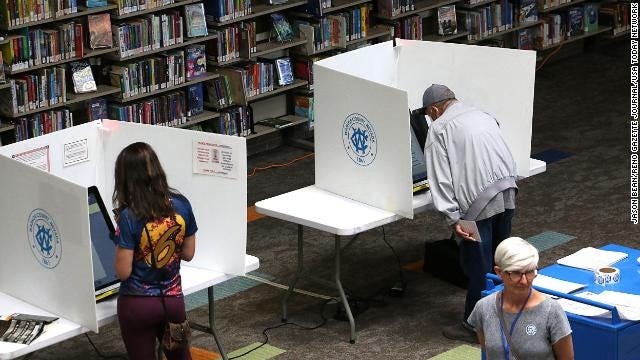The Full Belmonte, 6/15/2022
People vote during the primary election in Reno, Nevada, on Tuesday.
“Primary elections were held in Nevada, South Carolina, Maine and North Dakota on Tuesday. Much of the attention was on Nevada, where Republicans chose a vocal supporter of former President Donald Trump's lies about election fraud as their nominee to become the state's top elections official. In South Carolina, voters delivered the vengeance that Trump had sought as they ousted Rep. Tom Rice, one of the 10 House Republicans who voted for Trump's impeachment last year. But in a district near Rice's, a one-time Trump critic, Rep. Nancy Mace, narrowly survived a challenge from a Trump-endorsed rival -- displaying the difficulty of surviving in a GOP still dominated by the former President without embracing his grievances. A special election in Texas also resulted in a GOP win after Democrat Dan Sanchez conceded to Republican Mayra Flores in a contest for what had long been a Democratic-held House seat.” Read more at CNN
Jim Marchant addresses a crowd in front of the Nevada Capitol in March 2021 Photograph: Ricardo Torres-Cortez/AP
“Jim Marchant, a QAnon-linked candidate who has unabashedly embraced the idea of overturning future election results, won the Republican nomination to be Nevada’s top election official on Tuesday.
Marchant has said that he ran for secretary of state at the urging of Juan O Savin, a prominent QAnon influencer. After losing a congressional bid by more than 16,000 votes in 2020, Marchant claimed he was the victim of fraud, but failed to produce any evidence of it in a lawsuit seeking to overturning the result.
He has told voters that their vote hasn’t mattered for decades because Nevada’s leaders have ‘been installed by the deep state cabal’.
After Joe Biden won the state in 2020, Marchant supported sending an alternate pro-Trump slate of electors to Congress. He said in January he would be prepared to do the same in 2024.” Read more at The Guardian
“Voters in four states — South Carolina, Nevada, North Dakota and Maine — picked their candidates for the November election on Tuesday, while voters in Texas’s 34th District were filling a seat in a competitive special election. Below, some takeaways from those races.
1. The first impeachment casualty, but a split Trump verdict
After a bit of a break in the Trump storyline last week, Tuesday presented some particularly tantalizing primary results to compare and contrast, with the two biggest ones in coastal South Carolina districts.
Reps. Tom Rice (R-S.C.) and Nancy Mace (R-S.C.) both made big breaks with President Donald Trump after the Jan. 6, 2021, attack on the U.S. Capitol. Rice was perhaps the most surprising among the 10 GOP votes for impeachment. Mace denounced Trump as strongly as just about anyone in her party.
Then they diverged. Mace pulled a 180, even cutting a campaign video in front of Trump Tower, aligning with Trump when the former president endorsed her primary opponent. Rice, on the other hand, completely owned his impeachment vote and tried to explain it to his conservative district as a vote of conscience.
It worked for Mace. It didn’t for Rice.
Rice lost to Trump-backed state Rep. Russell Fry more than 2 to 1, with Fry taking the majority needed to avoid a runoff. Rice was below 25 percent.
Mace, though, won — leading Trump-backed former state representative Katie Arrington 53 percent to 45 percent with about 98 percent of the vote in.
Clearly, Trump can mobilize the base against an incumbent, but Arrington is the second House candidate he endorsed to lose a primary, after Rep. Madison Cawthorn (R-N.C.). Trump’s endorsement record in competitive races remains decidedly split.
On the plus side for Trump, Rice is the first impeachment supporter to go down. And after Rep. David G. Valadao (R-Calif.) got a real scare last week — despite Trump not backing his GOP opponent — it doesn’t look good for their ilk.
2. The GOP’s first pickup — potentially of many
Republicans are in line for major gains in the November midterms, and on Tuesday night, they notched a statement win — symbolically, at least.
Republican Mayra Flores defeated Democrat Dan Sanchez in the special election in Texas’s 34th Congressional District, where Rep. Filemon Vela (D-Tex.) resigned. It’s the third seat to flip in a mid-cycle special election since 2012.
Practically speaking, it probably doesn’t mean much. The district will look very different and much friendlier for Democrats come November, when Rep. Vicente Gonzalez (D-Tex.) — who wasn’t running Tuesday — will be a heavy favorite.
But symbolically and as a potential precursor, it could be a big one. That’s because Republicans made big inroads with Hispanic voters in South Texas in the 2020 election, and they’ve been keen to build on that. In 2020, Joe Biden won this district by four percentage points. (This is actually the second-most heavily Hispanic district in the country, and it will now be held by the GOP.)
Picking off a Democratic-leaning seat like this — no matter how temporary — is a shot in the arm for a GOP primed to make big gains in November.
It bears emphasizing that national Democrats didn’t try very hard here. But losing this seat is a bad narrative for them at the very least. They had better hope it’s not also a bad omen.
3. Nevada’s unsurprising — yet striking — results
The results in Nevada’s GOP primaries went about as expected. But some of them were still pretty remarkable.
In the Senate race, former state attorney general Adam Laxalt (R), who had Trump’s endorsement, defeated Sam Brown rather easily in a hard-fought race. In perhaps its best chance for a Senate pickup — Laxalt will face Sen. Catherine Cortez Masto (D-Nev.) in November — the GOP has chosen the guy who led the efforts to overturn the state’s 2020 election results. An election denier also won the secretary of state primary, with Jim Marchant emerging in that race. Marchant was actually one of the so-called fake electors who declared they were duly elected despite Biden winning the state.
And in the governor’s race, Clark County Sheriff Joe Lombardo, backed by Trump, won in a crowded field and currently has 38 percent of the vote. The more interesting result, though, might be what happened with the other candidates in that race. Former Republican senator Dean Heller finished a distant third, currently at just 15 percent.
The second-place finisher between them? Joey Gilbert, who was present not just at the ‘Stop the Steal’ rally on Jan. 6 in Washington but also near the Capitol when it was stormed. Several people present that day have won or been competitive in primaries. But most say they didn’t get as close to the Capitol. Here, one who did finished with lots more votes than a former U.S. senator.
4. More surprising GOP incumbent struggles
While the Mace and Rice results made sense, given all we know, they weren’t the only ones flirting with trouble in Tuesday’s primaries. So, too — more surprisingly — was Rep. William Timmons (R-S.C.).
Timmons was taking less than 53 percent of the vote with 99 percent of the vote in — startlingly close to runoff territory. He led his race by nearly 30 points, but he wasn’t expected to be in any real danger given his lack of a comparable move to alienate the conservative base.
Timmons did face a prominent Trump ally in Mark Burns, a pastor, but Trump endorsed Timmons. Timmons was also ceding substantial votes to a relative unknown in Michael LaPierre.
In some ways, the results in South Carolina echo what happened in Mississippi last week, when multiple incumbents found themselves in trouble, including one rather unexpectedly. But at least in that case, we could trace it to Republican Rep. Michael Guest’s vote for an independent 9/11-style Jan. 6 commission.” Read more at Washington Post
“Herschel Walker, a Republican Senate candidate from Georgia and a critic of absentee fathers, publicly acknowledged having a son he doesn’t see.” Read more at New York Times
“All eyes on are the Federal Reserve as it wraps up a two-day meeting on interest rates today. In a move to fight rampant inflation, the central bank is expected to increase its benchmark interest rate by three-quarters of a percentage point -- the biggest single hike since 1994. This follows the Fed's decision to raise rates by half a percentage point in May, the biggest increase in 22 years. So, what does this mean for consumers? Experts say every time the Fed raises rates, it becomes more expensive to borrow. That means higher interest costs for mortgages, home equity lines of credit, credit cards, student debt and car loans. Business loans will also get pricier.” Read more at CNN
“President Biden today will send letters to CEOs of the nation's largest oil companies saying he's considering invoking emergency powers to boost U.S. refinery output.
Why it matters: Biden's direct engagement with the oil giants is part of an ongoing White House effort to tame fuel prices despite limited options — and cast oil companies as responsible for consumers' higher bills, Axios' Ben Geman and Andrew Freedman report.
Biden tells top U.S. executives of seven big refiners and fuel companies that he's "prepared to use all reasonable and appropriate Federal Government tools and emergency authorities to increase refinery capacity and output in the near term."
‘I understand that many factors contributed to the business decisions to reduce refinery capacity, which occurred before I took office,’ he writes. ‘But at a time of war, refinery profit margins well above normal being passed directly onto American families are not acceptable.’
Adding an olive branch, the letter — sent to the heads of ExxonMobil, Chevron, BP America, Shell USA, Phillips 66, Marathon and Valero — calls for them to offer ‘concrete, near-term solutions.’
Biden says he wants ideas to address inventory, price and refinery capacity issues in the coming months, as well as transportation measures to bring fuel to market.
‘The crunch that families are facing deserves immediate action,’ Biden writes.
Between the lines: In seeking help from the oil industry, Biden is walking a political tightrope, eager to lower the cost at the pump without alienating his base, which backs policies to combat climate change.
Zoom out: Average U.S. gasoline prices have risen above $5 per gallon — fueling wider inflation, hitting consumers and creating political peril for Democrats ahead of the midterm elections.
What's next: Biden said Energy Secretary Jennifer Granholm will convene an ‘emergency meeting on this topic.’
The other side: Before seeing the letter, industry officials said they hope to work with the Biden administration and that discussions are already occurring.
‘We're encouraged by the administration reaching out and asking refiners what they can do to help resolve the situation from a policy standpoint,’ Frank Macchiarola, an S.V.P. at the American Petroleum Institute, told reporters on a call Tuesday.
Oil and gas producers have criticized the administration for not issuing new drilling leases on public lands, canceling the Keystone Pipeline and emphasizing its net zero carbon emissions climate agenda.” Read more at Axios
An exhibit at the Jan. 6 committee hearing on Monday touts a Trump defense fund that the committee says never existed. Exhibit: House Select Committee via AP
“The House select committee investigating the January 6 Capitol attack appeared to make the case at its second hearing that Donald Trump and his campaign engaged in potential fundraising fraud, raising $250m for a Trump ‘election defense fund’ that did not actually exist.
The hearing, led by Congresswoman Zoe Lofgren, also showed that Trump and the campaign raised millions for thefund and then funneled the money to, among other destinations, the Trump business properties as well as Trump’s own Save America political action committee.
In showing that Trump deceived donors into contributing money to the election defense fund – based on claims about a stolen election that his top advisers told him were nonsense – the panel suggested Trump engaged in potential fraud as well as other violations of federal law.” Read more at The Guardian
“The US expects more announcements of weapons and equipment packages to be sent to Ukraine to help in its fight against Russia at a meeting of nearly 50 countries in Brussels today, according to a senior US defense official. Ukrainian officials have warned that Russ city of Severodonetsk, which has seen some of the heaviest fighting. Without an influx of more weapons, some Ukrainian officials say it will be difficult to halt Russia's progress or reclaim occupied ground in the region. This, however, could force a tough decision for Western governments, which have offered immense support to Ukraine at an increasing cost to their own economies and national stockpiles of weapons.” Read more at CNN
“Senate Minority Leader Mitch McConnell said he supports the gun reform framework put forth by a bipartisan group of senators.” Read more at USA Today
“The House passed a US Supreme Court security bill yesterday, sending it to Biden for his signature just days after an armed man was arrested near the home of Justice Brett Kavanaugh.” Read more at Bloomberg
Pastor Bart Barber of Farmersville, Texas — who has been outspoken on abuse — was elected president of the Southern Baptist Convention yesterday. Photo: Jae C. Hong/AP
“The Southern Baptist Convention — at a deeply divided annual meeting in Anaheim, Calif. — yesterday overwhelmingly adopted reforms to combat sexual abuse.
Why it matters: The reforms follow a report, commissioned by the denomination, that found SBC leaders mishandled sexual abuse claims and survivors were met with resistance and stonewalling.
The reforms include a way to track pastors and other church workers credibly accused of sex abuse + a new task force to oversee further changes at the nation's largest Protestant denomination.” Read more at Axios
“The Supreme Court could rule today that a school district was wrong to prohibit an assistant high school football coach from praying on the field after games, further eroding the separation of church and state.” Read more at USA Today
“In a unanimous decision on Tuesday, FDA advisers voted in favor of authorizing Moderna’s Covid-19 vaccine for children and teens ages 6 to 17. The FDA, which typically follows the committee's decisions, will now decide whether to authorize the vaccine for emergency use in these age groups. Moderna's vaccine has been estimated to be 93.3% effective against symptomatic Covid-19 among adolescents ages 12 to 17 when the original coronavirus and the Alpha variant were dominant, according to an FDA briefing document. The vaccine was estimated to be 76.8% effective against symptomatic Covid-19 for children ages 6 to 11 when the Delta variant was dominant. Pfizer/BioNTech's Covid-19 vaccine is approved for people 16 and older, and it's authorized for use in children as young as 5.” Read more at CNN
“US basketball star Brittney Griner's detention in Russia has been extended again, Russian state media report.
The Women's National Basketball Association (WNBA) player will remain in detention until at least 2 July, reports Tass.
The Phoenix Mercury star was held on 17 February at a Moscow-area airport after cannabis oil was allegedly found in her luggage.
Ms Griner, 31, could face 10 years in prison if convicted.
On Tuesday, her detention was extended for an additional 18 days at ‘the request of the investigation’, according to a representative from the Khimki Court of the Moscow Region, reports Tass.
A Russian court previously extended her time in custody until 19 May and then again until mid-June, according to the BBC's US partner CBS News.” Read more at BBC
Image caption, As the WNBA season continues without her, fans and players alike have pushed for her safe return.
Photo: Wilfredo Lee/AP
“Heavy-equipment giant Caterpillar will move its HQ from Illinois to Texas, marking the second major company in six weeks to depart the Land of Lincoln, Axios Closer co-author Nathan Bomey writes.
Caterpillar said it's moving to the Dallas suburb of Irving, from Deerfield, outside Chicago.
Boeing announced in May that it's moving its HQ from Chicago to Arlington, Va.
Caterpillar's move affects just 230 people based at the Deerfield headquarters.
17,000 workers will stay in Illinois, about 12,000 of them in the Peoria area.” Read more at Axios
“New York's top court rejected an effort to free Happy the elephant from the Bronx Zoo, ruling that she does not meet the definition of '‘person’ who is being illegally confined.” Read more at USA Today
Happy the elephant makes historyAP
Photo: AP
“So long, Internet Explorer: As of today, Microsoft will no longer support the once-dominant browser that web surfers loved to hate.
Why it matters: The 27-year-old browser joins BlackBerry, dial-up modems and Palm Pilots in the dustbin of tech history, AP writes.
What's happening: A year ago, Microsoft said it would retire Explorer today — pushing users to its Edge browser, launched in 2015.
Flashback: Microsoft released the first version of Internet Explorer in 1995, the antediluvian era of web surfing dominated by the first widely popular browser, Netscape Navigator.
The launch signaled the beginning of the end of Navigator: Microsoft went on to tie IE and its ubiquitous Windows operating system together so tightly that many people simply used it by default.
State of play: Today, Google Chrome dominates with roughly a 65% share of the worldwide browser market, followed by Apple's Safari with 19%, according to internet analytics company Statcounter.
IE's heir, Edge, lags with 4% — just ahead of Firefox.” Read more at Axios
“U.S. President Joe Biden ended speculation over his planned trip to Saudi Arabia by confirming on Tuesday that it would indeed go ahead, with the president expected to make the trip as part of a tour from July 13-16 that includes stops in Israel and the West Bank.
Biden is set to make the journey despite outcry from human rights groups and figures within Biden’s own party, who have argued that a presidential visit gives a tacit blessing to Saudi Arabia’s rights abuses.
For Trita Parsi, Executive Vice President at the Quincy Institute for Responsible Statecraft, the trip is akin to ‘slapping a bargain Band-Aid on the gaping wound that the U.S.-Saudi relationship has become.’
‘Clearly, America should be working to build a healthier relationship with Saudi Arabia, but that simply isn’t possible unless and until the United States confronts the deep dysfunction at the core of that relationship—a dysfunction defined by the blind eye the U.S. has turned to Saudi’s support for Jihadi terrorism, the spread of Wahhabism, and its other destabilizing activities in the region,’ Parsi said in an emailed statement.
Biden’s visit is a climbdown from his vow to make Saudi Arabia a ‘pariah’ on the campaign trail and clashes with moves early in his presidency to freeze arms sales and pull back U.S. support for the war in Yemen.
Still, the thaw was coming even before the rise in oil prices, with Washington discreetly playing host to the crown prince’s brother, Khalid bin Salman, this time last year.
Despite the White House olive branches, disgust at the murder of U.S. resident Jamal Khashoggi at the hands of a Saudi operatives, (a killing the U.S. intelligence community determined was carried out on the orders of Crown Prince Mohammed bin Salman), is still felt in Washington. That has most recently manifested itself in the unveiling of Jamal Khashoggi Way, the new name for the street the Saudi embassy calls home.
Like Turkish President Recep Tayyip Erdogan before him, Biden is swapping tough rhetoric for appeasement, hoping that a sufficient show of rapprochement will convince the previously shunned crown prince to bless an oil production increase to help calm global oil prices—as well as reduce the price of U.S. gasoline.
As midterm elections approach, domestic economic concerns have taken priority for the Biden administration and it has begun attacking domestic energy companies for profiteering amid the squeeze on prices. ‘Exxon made more money than God this year,’ Biden said on Friday following a speech on his plans to rein in inflation.
If it’s clear why Biden needs Saudi Arabia at this moment, it’s less clear why Saudi Arabia needs Biden, with high oil prices helping prop up Saudi government coffers.
Especially as the Saudis can, if polls are accurate, simply wait Biden out. The second half of Biden’s presidential term is set to be even more deadlocked than the first, with Republicans likely to take control of the House of Representatives, if not the Senate, in November. (That has its own foreign policy implications, as Danielle Pletka explored last week).
A second Trump term in 2024, a distinct possibility, would be the icing on the cake for Riyadh, which would expect none of the friction that has defined the U.S.-Saudi relationship under Biden.
Despite huge military investments, security is still a major concern for the Saudis, however, and an explicit U.S. defense commitment would provide the quid pro quo the kingdom wants from Washington.
‘One thing after another has shaken their faith in the idea that the cavalry will be coming, and they want something other than words that will convince them that we are committed to their security,’ Steven A. Cook, a Middle East expert at the Council on Foreign Relations (and FP columnist) told Foreign Policy.
It’s not likely to be a one-way street, with Cook expecting Biden to push Saudi Arabia to make commitments on two difficult issues to provide him with political cover with Congress: Improving its human rights record as well as ties with Israel.
If Biden’s journey is solely based on boosting production, it may end up a waste, with a tight oil market leaving little slack.
‘The thing is, there isn’t much more oil in Saudi Arabia and the United Arab Emirates to really significantly change the market,’ Daniel Yergin, an oil historian and vice chairman at S&P Global Inc., told Bloomberg. ‘The supply situation is so razor thin.’
Janan Ganesh, writing in the Financial Times said the time is right for Biden to make the trip, and to abandon a simplistic democracy vs. autocracy framing while he’s at it. ‘The west is locked in a struggle against two specific autocracies. Not, as some would have it, against ‘autocracy,’ Ganesh writes. ‘The challenge from Russia and China (U.S. Republicans would name Iran as a third) is daunting enough without volunteering for a showdown with a complete mode of government.’” Read more at Foreign Policy
“EU readies Northern Ireland response. The European Commission is expected to publish its response to the United Kingdom after the British government published draft legislation that would unilaterally alter the Northern Ireland Protocol of the Brexit agreement. EU officials have already threatened legal action over the proposed changes, which they say are in breach of international law.” Read more at Foreign Policy
“Ethiopia peace talks. Ethiopian Prime Minister Abiy Ahmed on Tuesday announced the formation of a new committee to pursue peace talks with the Tigray People’s Liberation Front (TPLF) more than 18 months after the conflict began. In a letter published on Tuesday, the TPLF said it supported a ‘credible, impartial and principled peace process.’” Read more at Foreign Policy
“Denmark and Canada finally put an almost 50-year border dispute to rest on Tuesday, agreeing to split Hans Island, an 0.5 square mile island equidistant from the coasts of Canada and Greenland roughly down the middle.
The barren rock had become the site of the so called Whisky War, with Canadian and Danish forces planting flags (and bottles of Canadian whisky or Danish schnapps) to mark their territory over the years.
‘I think it was the friendliest of all wars,’ Mélanie Joly, Canada’s foreign minister, said on Tuesday. ‘I’m happy to see that we’re resolving it with friends, partners and allies. … It’s a win-win-win.’” Read more at Foreign Policy
“The inaugural flight of a controversial UK government scheme to send asylum-seekers to Rwanda was stopped on Tuesday at the eleventh hour, after an intervention by the European Court of Human Rights. According to the UK's PA Media news agency, ‘all migrants have been removed from the plane and the flight to Rwanda will not take off as scheduled tonight.’ Britain's government had announced the deal with the east African country in April. Those people granted asylum would then be allowed to resettle in Rwanda. The government insisted the program was aimed at disrupting people-smuggling networks and deterring migrants from making the dangerous sea journey across the English Channel from France.” Read more at CNN
“Anna Priymenko's youngest nephew, a budding football player, was only 5 years old when he was killed by a bomb that hit his family's home. Her other two nephews were 10 and 15. They loved sambo, a martial art that originated in the former USSR. Her only brother owned a textile business, donating countless blankets and pillows after the war began, and her mother was a kindergarten teacher. When she heard of their deaths, ‘the world collapsed,’ said Anna, 37. ‘I am basically left alone.’ Thousands of civilians have been killed in the Russian war on Ukraine, and countless people like Anna have been left alone in the aftermath, figuring out how to move forward when those they loved most are gone. In a special look by USA TODAY, these are the stories of the lives destroyed and devastated by Russia's war on Ukraine.” Read more at USA Today
“Biggest regret | Carrie Lam, whose tumultuous five-year term as Hong Kong’s chief executive is coming to an end, said her government could have prevented more deaths from Covid-19 with a stronger vaccination drive. But, in an interview with Bloomberg Television, she refused to apologize for anything during her leadership of the city, which suffered more than 9,000 fatalities when omicron swept through the under-vaccinated elderly population this year.” Read more at Bloomberg
“In trouble | The party that’s governed South Africa since the end of apartheid in 1994 is being buffeted by a scandal implicating its leader, Cyril Ramaphosa, setting back efforts to reclaim support lost during nine years of misrule by his predecessor Jacob Zuma. A top police unit is probing the circumstances around a large amount of foreign currency stolen from the president’s game farm two years ago, the latest blow for the African National Congress.” Read more at Bloomberg
“The World Health Organization will rename the monkeypox virus after concern that it could stoke racism and stigma, it said today.” Read more at Axios
A tick on a leaf. Photo: Patrick Pleul/picture alliance via Getty Images
“Confirmed and probable Lyme disease cases in the U.S. have at least tripled since the late 1990s — and there's no vaccine, Axios' Oriana Gonzalez reports.
But clinical trials for Lyme disease vaccines are underway. Pfizer and Valneva have developed a candidate that is in phase 2 human trials, according to the CDC.
UMass Medical School's MassBiologics is also developing a vaccine. Human trials are expected to begin soon.
What's happening: Ticks are more abundant than usual. Researchers attribute this to rising temperatures from climate change, which lead to prolonged summers and shorter winters and impact animal migration.
More people are spending time outdoors, increasing their chances of getting bitten by ticks and getting infected.
What you can do: Avoid bushy areas with tall grass. In places like that, wear clothing that covers most of your skin, and treat your clothing and gear with products containing 0.5% permethrin, the CDC recommends.
After spending time outdoors, check clothing, gear and pets for ticks and remove them if spotted.
Never squeeze a tick to remove it — that could worsen any infection. Use tweezers.” Read more at Axios
“Canada is no longer requiring vaccines for domestic travelers, transportation workers and federal employees. The country's vaccination rate is nearly 80%.” Read more at NPR
“Russia has banned 29 members of the British media, including five Guardian journalists, from entering the country, its foreign ministry has said.
Moscow said the sweeping action was a response to western sanctions and the ‘spreading of false information about Russia’, as well as ‘anti-Russian actions of the British government’.” Read more at The Guardian
National Park Service
“Yellowstone National Park officials assessed damage Tuesday as the park remained closed amid dangerous floods, mudslides and rockslides that have eroded roads, ripped apart bridges and forced evacuations this week. The water started to slowly recede Tuesday, but the record-level floods left all five entrances to the park closed at least through Wednesday, and they could remain closed for as long as a week, said park Superintendent Cam Sholly. The park has seen multiple road and bridge failures and power outages, causing the evacuations of more than 10,000 visitors. In days, heavy rain and rapid snowmelt caused a flood that may forever alter the human footprint on the park's terrain and the communities around it. The historic floodwaters pushed a popular fishing river off course – possibly permanently – and may force roadways to be rebuilt in new places. ‘The landscape literally and figuratively has changed dramatically in the last 36 hours,’ said Bill Berg, a commissioner in nearby Park County.” Read more at USA Today
Residents of Red Lodge, Montana, are seen clearing mud, water and debris from the small city's main street on Tuesday, June 14, 2022, after flood waters courses through a residential area with hundreds of homes.Matthew Brown, AP
“One video showed a house (pictured below) teetering and then falling into a river near Yellowstone.” Read more at Axios
Photo: Angie Lilly/via Reuters
“About a third of the U.S. population — stretching from cities like Chicago all the way to Raleigh, North Carolina — is under heat warnings and advisories today for triple-digit high temperatures.
Extreme heat is typically the No. 1 annual weather-related killer in the U.S., and the National Weather Service is calling this event ‘dangerous.’
Records that fell yesterday: 108°F in North Platte, Nebraska; 103°F in Lincoln, Nebraska, and Columbia, South Carolina; 102°F in Austin, Texas; and 100°F in St. Louis.” Read more at Axios
Tori, 13, told her parents in seventh grade that she didn’t want a boy’s body.Anne Vetter for The New York Times
A medical frontier
“This summer, the World Professional Association for Transgender Health, an international group of health care professionals, plans to release an update to its guidelines for giving care. The guidelines include a chapter on adolescents that is already generating heat from across the political spectrum.
In the decade since the last update, two intersecting forces have transformed the field of transgender health care for preteens and teens. The first is a large rise in the number of teenagers openly identifying as transgender and seeking care. The second is a right-wing backlash in the United States against allowing medical transitions for minors. I spent months reporting about this transformation for a New York Times Magazine cover story that was published online this morning.
As Scott Leibowitz, a child and adolescent psychiatrist who co-led the working group that wrote the adolescent chapter, told me, ‘Our world, the world of gender care, has exploded.’
The debate
Not surprisingly, there is a sharp divide among those who support gender-affirming care — the approach major American medical organizations have adopted for embracing children and teenagers who come out as transgender — and those who oppose medical treatments for minors, including medications that suppress puberty and hormones that change secondary-sex characteristics.
But there is also a divide among gender-affirming providers. It doesn’t break down along transgender-cisgender lines — both groups express a range of perspectives. The debate starts with how to evaluate kids who want these treatments.
The research
For transgender adults, the benefits of medical transition are well established and the rate of regret is low. Two studies also show positive long-term results for people who transitioned as teenagers. In 2011, researchers in Amsterdam found a ‘decrease in behavioral and emotional problems over time’ among 70 young patients who received puberty suppressants. Follow-up research showed that five years after going on to hormone treatments as teenagers, the 55 patients who remained in the study had the same or better levels of well-being as a control group of cisgender people their age. None regretted their treatment.
All the young people in the study had a childhood history of gender incongruence and went through a comprehensive diagnostic assessment, to establish the psychological and social context of their gender identity and how it might intersect with other mental-health conditions. That helped prompt Leibowitz and his co-authors to recommend a comprehensive diagnostic assessment (as well as parental consent and other criteria) as they updated the international care guidelines.
Other gender-affirming providers, however, argue that the purpose of an assessment is not to determine the basis of a kid’s gender identity. ‘People are who they say they are,’ said Colt St. Amand, a clinical psychologist and family-medicine physician at the Mayo Clinic. ‘So I am less concerned with certainty around identity and more concerned with hearing the person’s embodiment goals. Do you want to have a deep voice? Do you want to have breasts?’
The rise
Underlying the debate about assessments is the question of why the number of teenagers in the U.S. who identify as transgender has nearly doubled in recent years.
The authors of the adolescent chapter in the World Professional Association for Transgender Health’s Standards of Care said that the increased visibility of trans people in entertainment and the media had played a major — and positive — role in reducing stigma and helping many kids express themselves in ways they might have previously kept buried. But they also wrote about the role of ‘social influence,’ absorbed online or peer to peer. During adolescence, the chapter recognizes, peers and culture often affect how kids see themselves and who they want to be.
Some transgender advocates think that bringing up social influence in the context of trans identity is beyond the pale. It ‘defies reason’ to say that ‘enormous numbers of cisgender-privileged youth are magically transformed by mere social media exposure’ to the ‘most mortally at-risk minority class,’ the group International Transgender Health, which includes health care professionals, wrote when a draft of the care standards was released in December.
The politics
The backdrop for these debates is a right-wing effort to ban gender-related medical treatment for minors. So far, bans have passed in Arkansas, Arizona, and Alabama and have been proposed this year in about a dozen other states. As with other fraught issues like abortion, America is becoming a split screen. In red states, gender-related care for young people is already rare yet faces legal threats. At clinics that are mostly in progressive metropolitan areas, meanwhile, it’s not clear how common comprehensive assessments are. Some families are bewildered by a landscape in which there are no labels for distinguishing one type of therapeutic care from another.
For my Times Magazine story, I interviewed more than 60 clinicians and other experts as well as about two dozen young people seeking care and a similar number of parents. As is often the case in medicine, the question is how to apply existing research for the growing numbers of patients — in this case, teenagers — lining up for care. The intrusion of politics into science makes that more difficult.” Read more at New York Times
“The fatal killing of Democratic Party aide Seth Rich brought incalculable loss to his parents, Mary and Joel. Baseless conspiracy theories on Fox News made it even worse. Listen to them speak out for the first time since settling with Fox, or read their story.” Read more at NPR
“THE COLORADO AVALANCHE AND THE TAMPA BAY LIGHTNING...
Welcome to the Stanley Cup Final, everyone! Tonight, the Avalancheand Lightning open up their best-of-seven series in Denver, and both teams enter under very different circumstances.
The Avalanche haven't played since June 6 after sweeping the Oilers in the Western Conference Final. Colorado has played just 14 games this postseason and has not trailed in a series.
The Lightning last played on Saturday, finishing off the Rangers in six games. Tampa Bay has played 17 playoff games and trailed its opening series 3-2 and its Eastern Conference series 2-0.
This is the Avalanche's third Stanley Cup Final appearance ever. They also won in 2001 and 1996.
This is the Lightning's third Stanley Cup Final appearance... in the last three years (and fifth overall). They're looking to become the first team to three-peat since the Islanders won four straight from 1980-83.” Read more at Axios
“Serena Williams isn't retiring yet. The tennis legend says she will compete in Wimbledon this year.” Read more at NPR
“The U.S. Open, unlike Wimbledon, will allow tennis players from Russia and Belarus.” Read more at New York Times
“A stray dog nicknamed ''Mighty Joe Young'' was seen running from a gorilla inside San Diego Zoo Safari Park Sunday. Video footage showed the dog unexpectedly enter the gorilla exhibit, and onlookers can be heard trying to lure it away from the primate.” Read more at USA Today
Officers help remove the dog, ‘Mighty Joe Young’ from a gorilla exhibit at the San Diego Zoo.San Diego County Humane Society
BTS performs onstage during the 64th Annual Grammy Awards in Las Vegas in April. Photo: Matt Winkelmeyer/Getty Images
“The most famous band on Earth — K-pop's BTS — is letting its members explore solo projects, Axios' Hope King and Herb Scribner report.
The band was careful to say they’re not breaking up. A spokesperson said the group will ‘remain active in various different formats.’
Why it matters: History has shown (see: One Direction), that whenever one member pursues a solo career and hits it big, the bands basically never reunite.” Read more at Axios
“Lives Lived: The economist Sharon Oster was the first woman to become a tenured professor of the Yale School of Management, and its first female dean. She died at 73.” Read more at New York Times




















